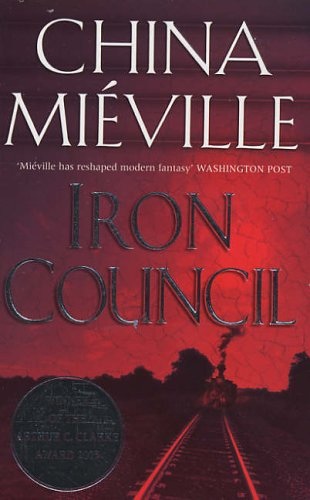










There are several stories woven together in this novel - another on the New Crobuzon series (if you would call that a series). The very first is an expedition of New Crobuzon 'rebels' let by Cutter, setting out to find Judah Low and the Iron Council. The second theme is Judah's own tale - an observer and prospector for a new cross-country railroad, then a mage, and then a revolutionary. This is inextricably bound up with the tale of the train itself - slowly moving across the face of the world as the track is built, finally revolting from its overlords, workers and train taking off on their own. The strange ecology that comes into being as a feral train and those that keep it independent and moving it the Iron Council. Now something of a legend back in New Crobuzon, and hated by those it rebelled against.
Back in the city itself, the themes of oppression and revolution play themselves out. Ori, a young man, is drawn into the mild sedition or an organization (perhaps it is a 'dys'organization) called the Caucus. These meet secretively, engage in mild guerilla politics, but are mostly a discussion forum. Finally dissatisfied, he shifts to a more violent form of protest, let by the bull-headed Toro on a quest to kill New Crobuzon's mayor and bring down the current regime. New Crobuzon itself returns as a major theme, much like the one it played in Perdido Street Station. But while that book saw the city as something vitally and sometimes fearfully alive with both horrors and delights, Iron Council presents a picture of a degenerating social class struggle, a collapsing economy, and an increasing oppressive government.
The stories are sometimes disjoint, but inevitably intertwined, as the Iron Council becomes less a group of angry train builders and more a symbol for what is happening in the city. The great, peripatetic path of the Iron Council leads inevitably back to the city. The war with the Tesh rides on the insurgency. Judah, Cutter, and Ori are the players that tie these threads together into an unnerving tapestry straight out of Hieronymus Bosch.
When an author who has been consistently excellent falls short of his previous efforts, there is a tendency for the reviewer to be excessively critical in response. While I intend to avoid that extreme, Iron Council has some very real flaws that deserve some attention. The first is the extremely slow start of the story lines. Most of the first half of the book is the history of Judah and the train. While the core facts of this history are vital to an understanding of the story to come, Mieville seizes on the opportunity to show off his control of language. Scenery is described in almost excruciating detail and the writing style, full or portent and metaphor is florid, even to the point of invented words. By the time the story became more than historical narrative this reader was feeling a bit dazed, and I had a great deal of trouble re-establishing my reading momentum.
On top of considerable linguistic skills, Mieville is an extremely inventive author. But in Iron Council he, like the city itself, becomes too dependent on mechanism. Judah is a golem master, and these creations play dues ex machine roles in moving the story forward. Just as the city makes monsters out of human, machine, and animal parts, Mieville constructs his own version of the English language, with its own occasional horrors. The reader is often undecided if he is reading a work of fiction, a metaphoric autobiography, or something written purely for display.
If not as readable as Mieville's previous books, this is still a landmark effort and should be accorded respect. It isn't a 'reader friendly' book - none of the New Crobuzon novels are really that - but it is one that generates both thought and new ideas in the reader. If you are new to the series, start with Perdido Street Station, since this story is very much embedded in that one. If you are looking for stylistic parallels then you will find Mieville's facility with language quite similar to Umberto Eco's, and can make your decision accordingly.

